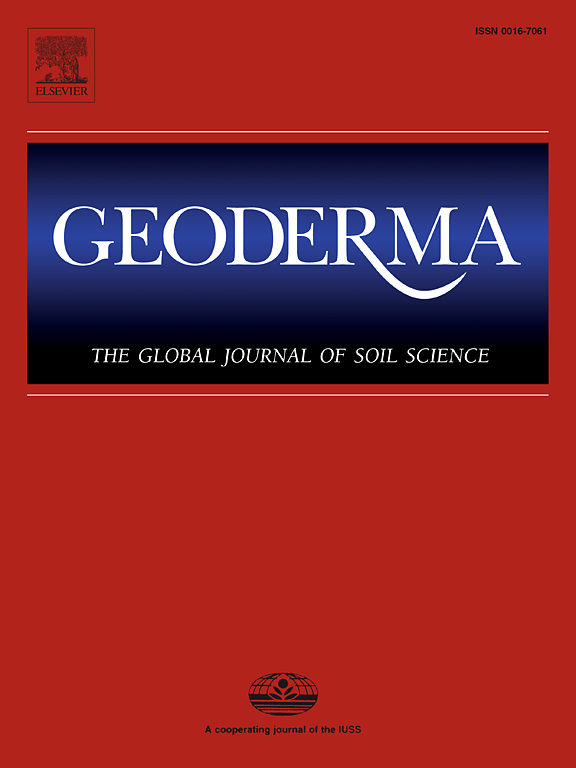Mesoscale soil moisture measurements along the rover route using the mobile cosmic-ray neutron sensing in the eastern Tibetan Plateau
IF 5.6
1区 农林科学
Q1 SOIL SCIENCE
引用次数: 0
Abstract
Water resources in the soil play an essential role in hydrological processes and ecosystem functions on the Tibetan Plateau. However, accurately measuring soil moisture distribution in this region presents challenges due to the diverse ecosystem types, complex terrain, and harsh environmental conditions. In this study, we introduce an approach for estimating mesoscale soil moisture in the Qilian Mountains (QLM) region of the eastern Tibetan Plateau using a cosmic-ray neutron rover. Soil moisture estimates derived from neutron count rates, newly adjusted by vegetation effects, demonstrated good agreement with soil moisture measurements obtained through soil sampling at 26 calibration sites across the region (RMSE = 0.025 g g−1). The calibration parameter N0_NDVI was 443 cpm in the QLM. Utilizing NDVI as vegetation correction method showed potential improvements in the accuracy of converting neutron counts to soil moisture across the diverse mountainous ecosystem types. The newly developed calibration equation provided a high-precision, high spatial resolution soil moisture transect across various landscapes measured by the rover. The average mesoscale soil moisture along the rover route varied by ecosystem types, with values of 0.10 g/g in deserts, 0.17 g/g in grasslands, 0.13 g/g in forests, 0.18 g/g in subalpine shrublands, and 0.20 g/g in croplands. Land cover types emerged as crucial determinants of mesoscale soil moisture variability in the QLM region. These findings offer valuable mesoscale soil moisture data and new insights into soil water information at the transect scale across diverse ecosystem types in the Tibetan Plateau.
利用移动式宇宙射线中子传感技术在青藏高原东部进行漫游车沿线中尺度土壤水分测量
土壤中的水资源对青藏高原的水文过程和生态系统功能起着至关重要的作用。然而,由于该地区生态系统类型多样、地形复杂、环境条件恶劣,准确测量土壤水分分布面临着挑战。在本研究中,我们介绍了一种利用宇宙射线中子漫游车估算青藏高原东部祁连山(QLM)地区中尺度土壤水分的方法。根据中子计数率得出的土壤水分估算值,经过植被影响的新调整,与该地区26个校准点的土壤取样测量结果显示出良好的一致性(RMSE = 0.025 g-1)。在 QLM 中,校准参数 N0_NDVI 为 443 cpm。利用 NDVI 作为植被校正方法表明,在不同的山区生态系统类型中,将中子计数转换为土壤湿度的准确性可能会有所提高。新开发的校正方程提供了一个高精度、高空间分辨率的土壤水分横断面,横断面横跨漫游车测量的各种地貌。漫游车沿线的平均中尺度土壤湿度因生态系统类型而异,沙漠为 0.10 克/克,草原为 0.17 克/克,森林为 0.13 克/克,亚高山灌木林为 0.18 克/克,耕地为 0.20 克/克。土地覆被类型是青藏高原地区中尺度土壤水分变化的关键决定因素。这些发现提供了宝贵的中尺度土壤水分数据,并对青藏高原不同生态系统类型横断面尺度的土壤水分信息有了新的认识。
本文章由计算机程序翻译,如有差异,请以英文原文为准。
求助全文
约1分钟内获得全文
求助全文
来源期刊

Geoderma
农林科学-土壤科学
CiteScore
11.80
自引率
6.60%
发文量
597
审稿时长
58 days
期刊介绍:
Geoderma - the global journal of soil science - welcomes authors, readers and soil research from all parts of the world, encourages worldwide soil studies, and embraces all aspects of soil science and its associated pedagogy. The journal particularly welcomes interdisciplinary work focusing on dynamic soil processes and functions across space and time.
 求助内容:
求助内容: 应助结果提醒方式:
应助结果提醒方式:


